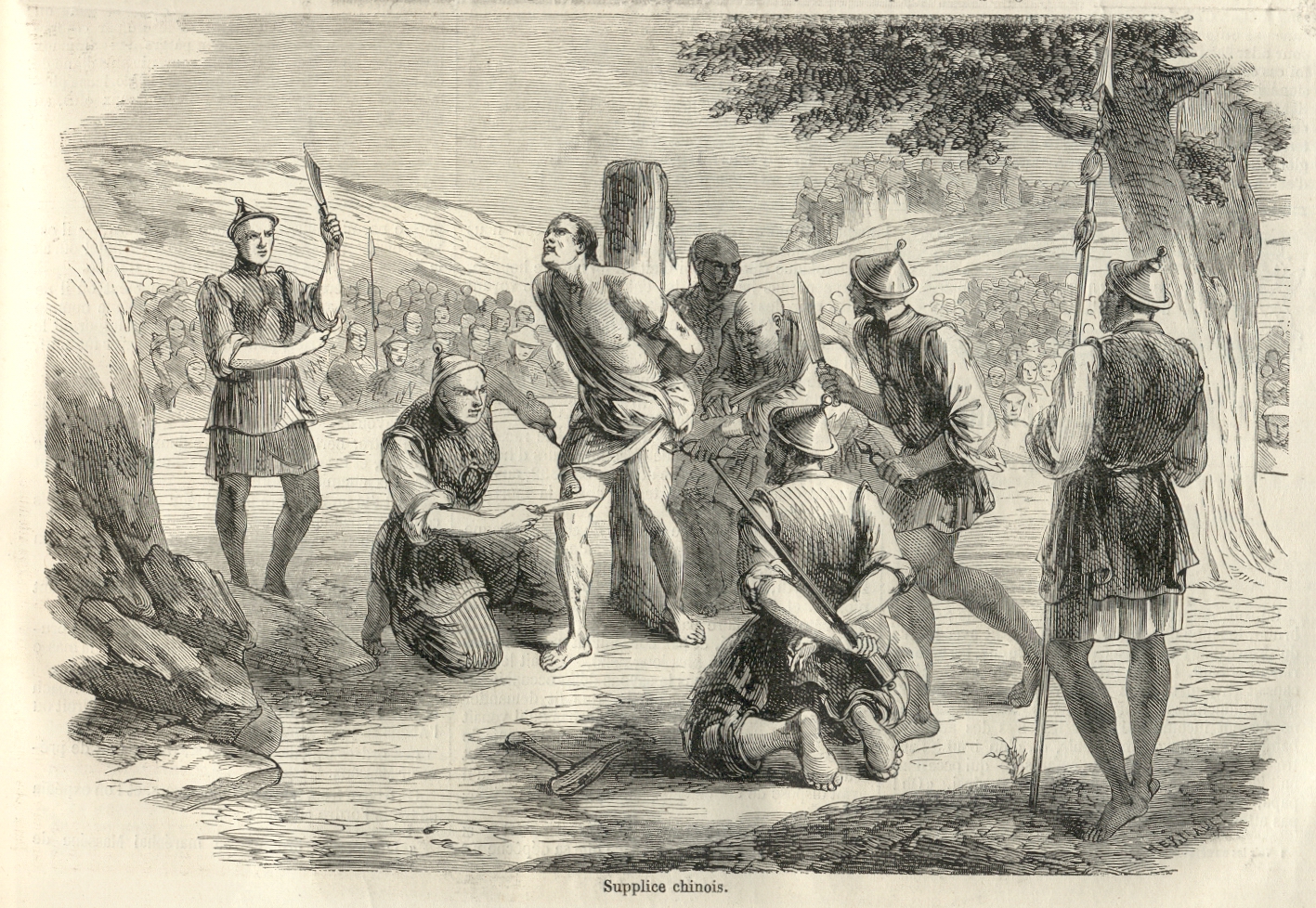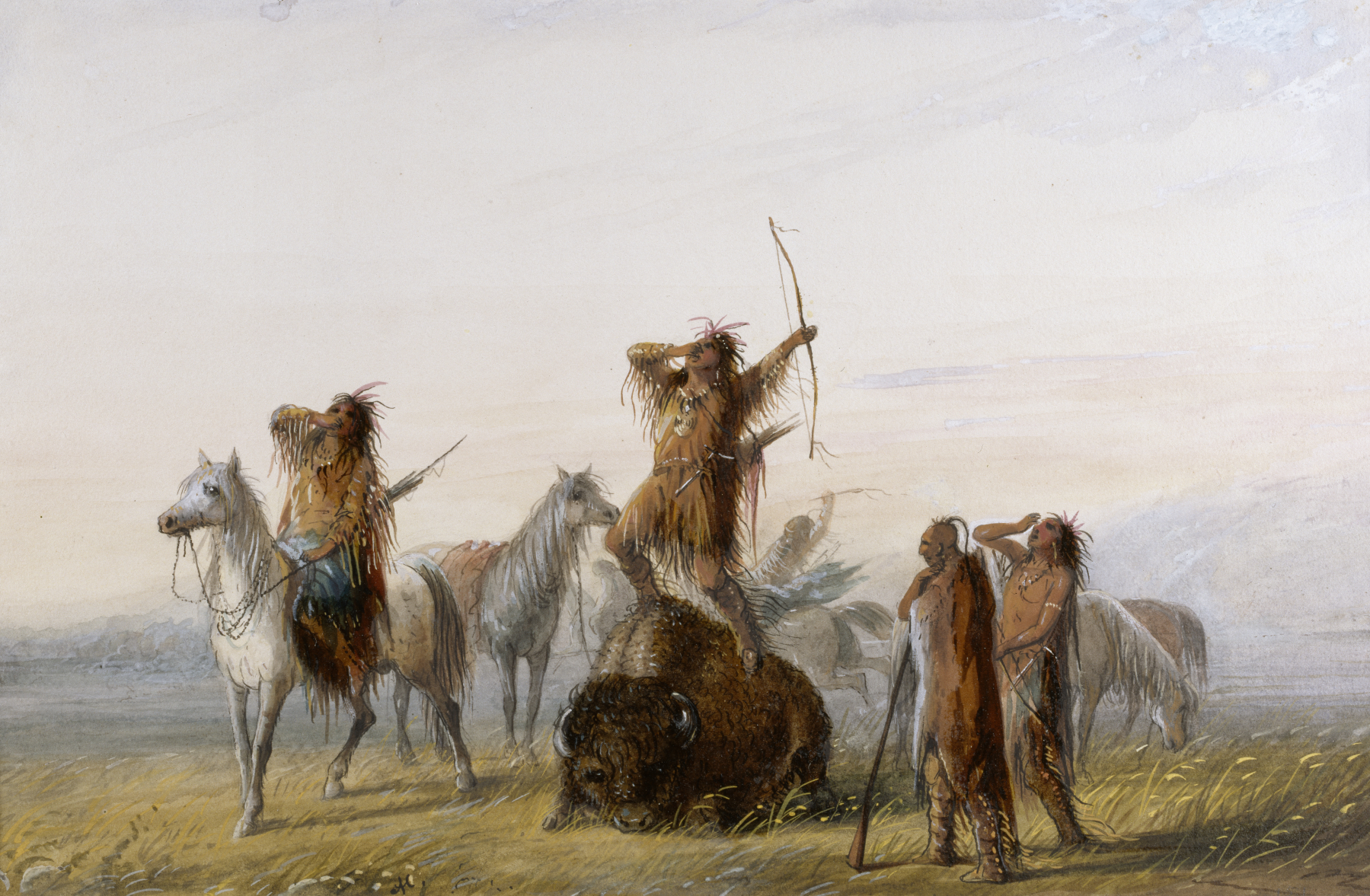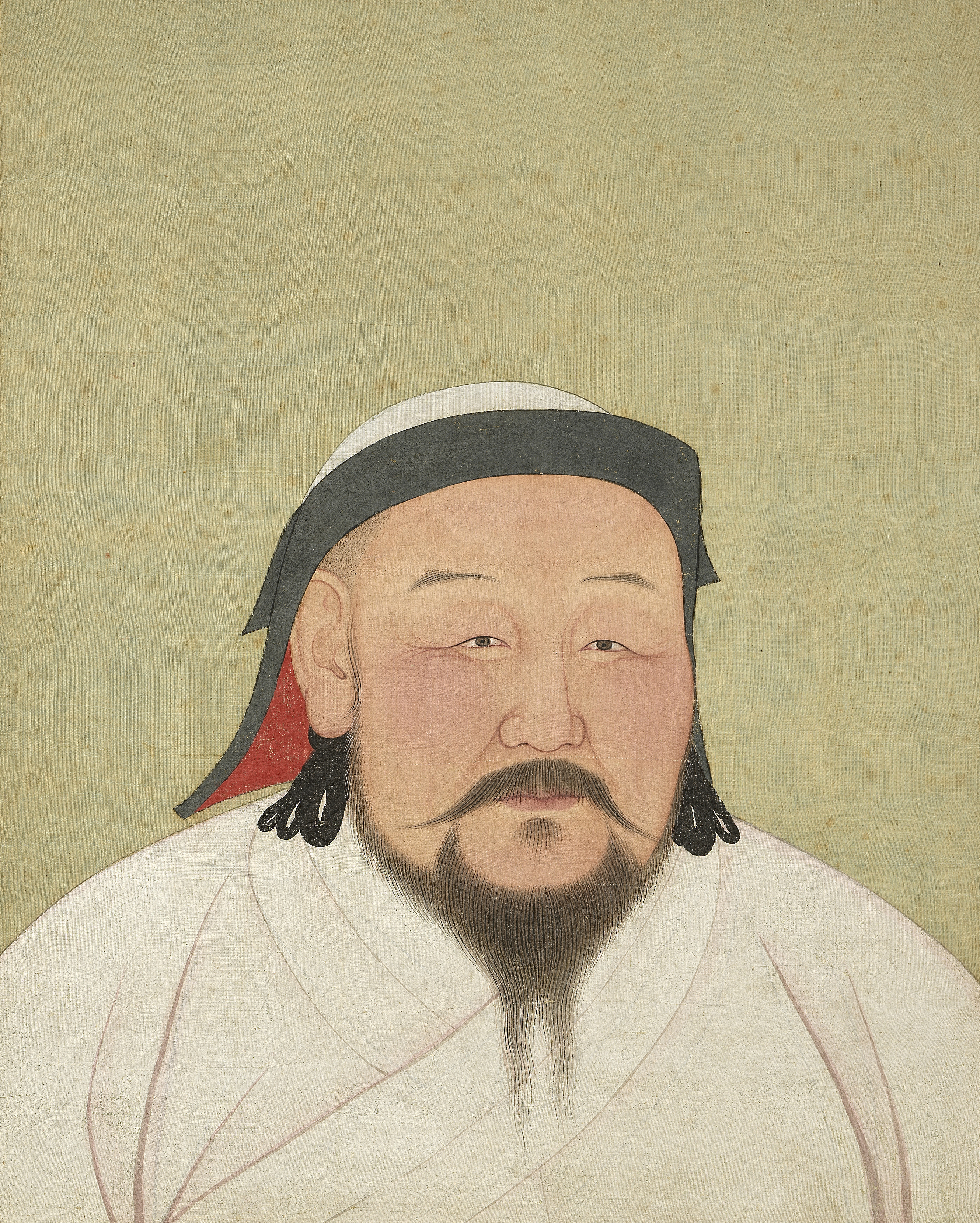|
Slow Slicing
''Lingchi'' ( IPA: , ), usually translated "slow slicing" or "death by a thousand cuts", was a form of torture and execution used in China from roughly 900 until it was banned in 1905. It was also used in Vietnam and Korea. In this form of execution, a knife was used to methodically remove portions of the body over an extended period of time, eventually resulting in death. ''Lingchi'' was reserved for crimes viewed as especially heinous, such as treason. Even after the practice was outlawed, the concept itself has still appeared across many types of media. Etymology The word was used to describe the prolonging of a person's agony when the person is being killed. One theory suggests that it grew to be a specific torture technique. An alternative theory suggests that the term originated from the Khitan language, as the penal meaning of the word emerged during the Khitan Liao dynasty. Description The process involved tying the condemned prisoner to a wooden frame, usually in ... [...More Info...] [...Related Items...] OR: [Wikipedia] [Google] [Baidu] |
Jimo
Jimo District (), formerly Jimo City (), is a District of Qingdao, Shandong. Location Jimo is located in the southwest of the Shandong Peninsula, bordered by the Yellow Sea on the east and Mount Lao on the south. Climate Jimo has a moderate monsoon climate. The yearly average temperature is about , and average annual precipitation is . History Jimo was established in the Eastern Zhou dynasty, at which time it was the second largest settlement in Shandong. The Siege of Jimo in 279 BC, otherwise unremarkable, is remembered for the ruse that ended it. Tian Dan was a general of the State of Qi who had just lost 70 cities to the Yan. When Jimo, their penultimate city, was under fire, he collected more than 1,000 oxen, tied sharp daggers to their ears, tied straw to their tails, and dressed them in colourful cloth to make them look like dragons. At dead of night the Qi set the tails alight and drove the oxen towards the enemy camp. The panicking enemy soldiers were wiped out ... [...More Info...] [...Related Items...] OR: [Wikipedia] [Google] [Baidu] |
Peking Gazette
The ''Peking Gazette'' was an official bulletin published with changing frequency in Beijing until 1912, when the Qing dynasty fell and Republican China was born. The translated name, as it is known to Western sources, comes from Ming dynasty-era Jesuits, who followed the bulletin for its political contents. The ''Peking Gazette'' became a venue for political grievances and infighting during the reign of the Wanli Emperor in the late Ming dynasty, when '' literati'' factions would submit politicized memorials that the Emperor often abstained from reviewing. From around 1730, the publication was in Chinese called ''Jing Bao'' (京报, sometimes transliterated ''Ching Pao''), literally "the Capital Report". It contained information on court appointments, edicts, and the official memorials submitted to the emperor, and the decisions made or deferred.Wolfgang Mohr, ''Die moderne chinesische Tagespresse'', vol. 1 (Wiesbaden, 1976), pp. 13–14. Author J.C. Sun in his book ''Modern Chi ... [...More Info...] [...Related Items...] OR: [Wikipedia] [Google] [Baidu] |
Yuan Chonghuan
Yuan Chonghuan (; 6 June 1584 – 22 September 1630), courtesy name Yuansu, art name Ziru, was a Chinese politician, military general and writer who served under the Ming dynasty. Remembered as a national hero of Ming China and widely regarded as a culture hero in Chinese culture, he is best known for defending Liaoning from invasions launched by the Jurchen people, Jurchen-led Later Jin (1616-1636), Later Jin dynasty. As a general, Yuan Chonghuan excelled as a cannoneer and sought to incorporate European cannon designs into the Ming arsenal. Yuan's military career reached its height when he defeated the Later Jin ruler, Nurhaci, and his army in the first Battle of Ningyuan, that resulted in Nurhaci's death. Later on, Yuan also defeated Nurhaci's son and successor, Hong Taiji, and his 200,000-strong army composed of mostly ethnic Mongols, Mongol soldiers at the second Battle of Ningyuan. Yuan met his end when he was arrested and executed by ''lingchi'' ("slow slicing") on the or ... [...More Info...] [...Related Items...] OR: [Wikipedia] [Google] [Baidu] |
Shen Defu
Shen Defu () (1578–1642) was a Chinese writer and bureaucrat during the Ming Dynasty. He lived in Zhejiang. In 1618, he achieved the rank of ''juren'' in the Imperial examinations, but failed an exam for promotion to the rank of ''jinshi'' a year later. His principal work was the ''Wanli ye huo bian'' (Unofficial Gleanings of the Wanli Era, ), which he completed in 1607. Perhaps because he failed to move beyond the rank of provincial office, in this text he inveighs again the excesses of imperial office holders, including extravagant dress. He was married for several years to the courtesan A courtesan is a prostitute with a courtly, wealthy, or upper-class clientele. Historically, the term referred to a courtier, a person who attended the court of a monarch or other powerful person. History In European feudal society, the co ... Xue Susu. References {{Authority control Ming dynasty historians 1578 births 1642 deaths Historians from Beijing 17th-century Chinese ... [...More Info...] [...Related Items...] OR: [Wikipedia] [Google] [Baidu] |
Coup De Grâce
A coup de grâce (; ) is an act of mercy killing in which a person or animal is struck with a melee weapon or shot with a projectile to end their suffering from mortal wounds with or without their consent. Its meaning has extended to refer to the final event that causes a figurative death. Today, a coup de grâce for incapacitated soldiers would be a war crime: the laws of war mandate caring for the incapacitated and prohibit mercy killing. See also *Euthanasia *Animal euthanasia Animal euthanasia (euthanasia from ; "good death") is the act of killing an animal humanely, most commonly with injectable drugs. Reasons for euthanasia include incurable (and especially painful) conditions or diseases, lack of resources to con ... * Misericorde References External links * {{DEFAULTSORT:Coup De Grace Euthanasia ... [...More Info...] [...Related Items...] OR: [Wikipedia] [Google] [Baidu] |
Ming Dynasty
The Ming dynasty, officially the Great Ming, was an Dynasties of China, imperial dynasty of China that ruled from 1368 to 1644, following the collapse of the Mongol Empire, Mongol-led Yuan dynasty. The Ming was the last imperial dynasty of China ruled by the Han people, the majority ethnic group in China. Although the primary capital of Beijing fell in 1644 to a rebellion led by Li Zicheng (who established the short-lived Shun dynasty), numerous rump state, rump regimes ruled by remnants of the House of Zhu, Ming imperial family, collectively called the Southern Ming, survived until 1662. The Ming dynasty's founder, the Hongwu Emperor (1368–1398), attempted to create a society of self-sufficient rural communities ordered in a rigid, immobile system that would guarantee and support a permanent class of soldiers for his dynasty: the empire's standing army exceeded one million troops and the naval history of China, navy's dockyards in Nanjing were the largest in the world. H ... [...More Info...] [...Related Items...] OR: [Wikipedia] [Google] [Baidu] |
The Injustice To Dou E
''Dou E Yuan'', commonly translated as ''The Injustice to Dou E'', and also known as ''Snow in Midsummer'', is a Chinese zaju play written by Guan Hanqing (c. 1241–1320) during the Yuan dynasty. The full Chinese title of the play is ''Gan Tian Dong Di Dou E Yuan'', which roughly translates to ''The Injustice to Dou E that Touched Heaven and Earth''. The story follows a child bride turned widow, Dou E, who is wrongly convicted of crimes by a corrupt court official for actions perpetrated by a rejected suitor, Zhang the mule. After her execution, three prophesied phenomena occur to prove her innocence, including blood raining from the sky, snow in June and a three-year drought. After a visit from the ghost of Dou E, her father eventually brings the corrupt court official, a doctor and Mule Zhang to justice, thereby vindicating his daughter. Today, the phrase "snowing in June" is still widely used among Chinese speakers as a metaphor for a miscarriage of justice. The story has ... [...More Info...] [...Related Items...] OR: [Wikipedia] [Google] [Baidu] |
Guan Hanqing
Guan Hanqing (, 1241–1320); sobriquet Yǐzhāi (已齋), Yīzhāi (一齋), Yǐzhāisǒu (已齋叟); was a Chinese dramatist, playwright, and poet during the Yuan Dynasty. He has been described as among the most prolific and highly regarded dramatists of the Yuan period. Life Guan Hanqing was undoubtedly the most productive and creative playwright of northern plays. Described by Jia Zhongming as “the leader of the Pear Garden” (liyuan lingxiu 梨園領袖), Guan was fully immersed in the theatrical scene of his time and was well known amongst both actors and his fellow peers. He is even said to have painted and powdered his face (mianfu fenmo 面傅粉墨) while acting on stage. He is credited with the writing of 68 plays, of which only 18 survive, three in fragments. These were written mostly in the vernacular of the time. In some cases, attribution is highly disputed. In addition to playwriting, Guan Hanqing is also said to be a master of songs (sanqu 散曲). 57 of ... [...More Info...] [...Related Items...] OR: [Wikipedia] [Google] [Baidu] |
Yuan Dynasty
The Yuan dynasty ( ; zh, c=元朝, p=Yuáncháo), officially the Great Yuan (; Mongolian language, Mongolian: , , literally 'Great Yuan State'), was a Mongol-led imperial dynasty of China and a successor state to the Mongol Empire after Division of the Mongol Empire, its division. It was established by Kublai (Emperor Shizu or Setsen Khan), the fifth khagan-emperor of the Mongol Empire from the Borjigin clan, and lasted from 1271 to 1368. In Chinese history, the Yuan dynasty followed the Song dynasty and preceded the Ming dynasty. Although Genghis Khan's enthronement as Khagan in 1206 was described in Chinese language, Chinese as the Han Chinese, Han-style title of Emperor of China, Emperor and the Mongol Empire had ruled territories including modern-day northern China for decades, it was not until 1271 that Kublai Khan officially proclaimed the dynasty in the traditional Han style, and the conquest was not complete until 1279 when the Southern Song dynasty was defeated in t ... [...More Info...] [...Related Items...] OR: [Wikipedia] [Google] [Baidu] |
Dismemberment
Dismemberment is the act of completely disconnecting and/or removing the limbs, skin, and/or organs from a living or dead being. It has been practiced upon human beings as a form of capital punishment, especially in connection with regicide, but can occur as a result of a traumatic accident, or in connection with murder, suicide, or cannibalism. As opposed to surgical amputation of limbs, dismemberment is often fatal. In criminology, a distinction is made between offensive dismemberment, in which dismemberment is the primary objective of the dismemberer, and defensive dismemberment, in which the motivation is to destroy evidence. In 2019, American psychiatrists and medical professionals Michael H. Stone, Gary Brucato, and Ann Burgess proposed formal criteria by which "dismemberment" might be systematically distinguished from the act of mutilation, as these terms are commonly used interchangeably. They suggested that dismemberment involves "the entire removal, by any ... [...More Info...] [...Related Items...] OR: [Wikipedia] [Google] [Baidu] |
Robert Heindl
Robert Heindl (24 July 1883 – 25 September 1958) was a German criminologist and lawyer, most noted for his advocacy of fingerprinting. This began after he read an article in 1902 on Edward Henry's use of the method in India - he requested the relevant files from the British imperial authorities in Calcutta, studied them extensively and then proposed to all the main police authorities in Germany that they adopt the technique. He was born in Munich and died in Irschenhausen. In 1953 he was awarded the Cross of Merit of the Order of Merit of the Federal Republic of Germany The Order of Merit of the Federal Republic of Germany (, or , BVO) is the highest state decoration, federal decoration of the Federal Republic of Germany. It may be awarded for any field of endeavor. It was created by the first List of president .... References Lawyers from Munich 1883 births 1958 deaths German criminologists 20th-century German lawyers Fingerprints Officers Crosses of the Order ... [...More Info...] [...Related Items...] OR: [Wikipedia] [Google] [Baidu] |






